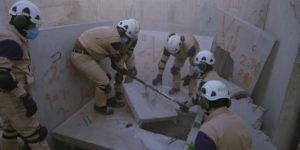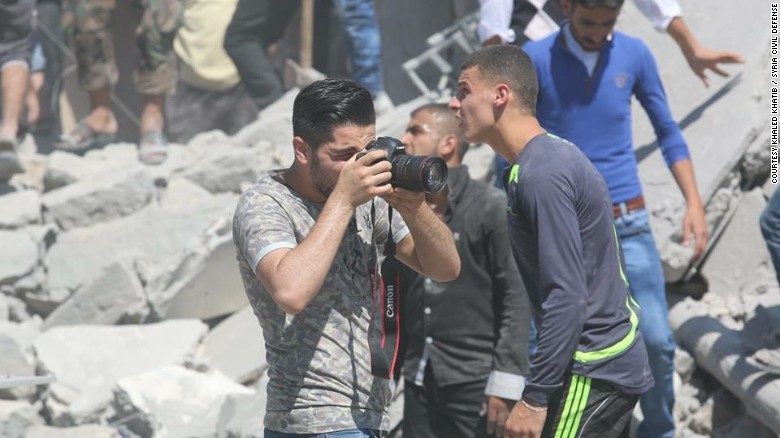
Most 21-year-olds haven’t shot Oscar-winning films in war zones. However, Khaled Khatib is not your average 21-year-old.
Born in Aleppo, Syria, Khatib is one of the cinematographers for The White Helmets, a Netflix-produced documentary which won Best Documentary (Short Subject) at 2017’s Academy Awards.

The film chronicles the work of Syrian Civil Defense (popularly known as “White Helmets” for their distinctive headwear), a humanitarian organization that rescues victims of bombings and shelling in rebel-held areas of Syria.
When the Syrian Civil War cut his education short, Khatib decided he could have a far bigger impact by learning to use a camera and documenting Syrian Civil Defense’s work for the world to see. This eventually led him to meet British director Orlando von Einsiedel, who helped the Netflix documentary get off the ground.
Cinema Escapist had the chance to talk with Khatib about his experiences filming in Aleppo, as well as his hopes and dreams for the future.
• • •
Tell us a bit about Syrian Civil Defense (otherwise known as the White Helmets) and how you came to join them.
In late 2012, many neighborhoods of Aleppo were liberated from the Assad regime, and the regime started bombing those areas. That’s when people realized we needed some sort of civil defense group to rescue civilians from bombings — which is how Syrian Civil Defense itself got started.
Afterwards, in early 2013, I became a photographer with the Aleppo Media Center (AMC), where I first learned how to use a camera and take pictures. After receiving that training, I decided to volunteer with the White Helmets.
I really believed in the White Helmets’ mission and wanted to do something meaningful that didn’t involve fighting, so I thought I might as well use my skills to tell their story to the world.
A video from Khatib’s first mission.
What is the most memorable mission that you had with Syrian Civil Defense?
My first mission was the most memorable. That time, the Assad regime targeted some civilian buildings in Aleppo and massacred more than 1,000 people. The rescue operation took ten days and, during those ten days, I saw and filmed many horrible casualties and people dying — it was not a good image for me. Those were probably the hardest ten days of my life, and I’ll remember them forever.
After that mission, I thought about leaving the White Helmets because I hated what I saw so much. However, on my next mission, during which we responded to another bombing in eastern Aleppo, we managed to rescue more people from under the rubble who were still alive, which were much happier moments to film. Our volunteers also managed to save a young girl from the rubble — which I caught on video, and that video ended up getting many views on YouTube.
That motivated me to keep staying with the White Helmets, because I started to realize how important the work I did was in spreading the message about who are the criminals and who are the innocents in Syria.
How old were you at this time?
I was 17.
Wow, that is very young.
Well, my education was cut short. Education stopped in our area because there was shelling and other sorts of massacres every day… Syria’s education system only exists in areas controlled by the Assad regime, which I cannot go to.
In 2013, I simply wanted to document what was going on in my city. I thought it was more important than being a student — even if I couldn’t go to school and study, I could still take pictures.

How did you meet British director Orlando von Einsiedel and become involved with making the White Helmets documentary?
I first met Orlando in November 2015. He’d seen many videos of White Helmets operations, and thought our work was very inspiring. He decided to meet with us, and to introduce the idea of making a documentary. We were happy to coordinate with the idea because we agreed it’s very important for the entire world to know about what’s happening in Syria, and to be aware of who the White Helmets are.
I then started communicating with Hassan Kattan and Fadi Al Halabi, the two other cameramen in Syria that helped film the documentary. The two of them and I shot all the scenes in Aleppo, and there was a British cameraman (Franklin Dow) filming the part of the documentary that happens in Turkey, where White Helmet volunteers are receiving training about firefighting and rescue.
How long did the documentary take to shoot in total?
The shooting only took around 2.5 months. The entire filmmaking process — including producing, editing — took around a year total.
Was it very complicated to coordinate across all these people and shoot under such challenging circumstances?
Well, by this time, Hassan, Fadi, and I already had several years of very good experience both filming [in Aleppo] and distributing our videos, so this was something we were accustomed to.
We shot digital footage, which we gave to Orlando along with what we thought the message for that footage should be. Orlando is a great filmmaker; he worked with us closely and told us how to make the message for the film even better, and the final product became very good as a result.
How did you feel when The White Helmets won an Oscar in February?
I became very happy because I realized that millions of people would be hearing our message and knowing more about what is going on in Syria.
As a cameraman and photographer, I didn’t think that we would ever make a film that went to the Oscars. The most important thing to me was just to tell the true story of Syria, and I’m glad that story reached all these important and successful festivals across the world, like the Oscars.
My hope is still that this film will help the war to stop, for civilians to stop experiencing shelling and bombing. We didn’t make this film to take awards, we made this film to build awareness, and to encourage everyone to do their best to stop this massacre in Syria.

How did your colleagues in the White Helmets feel about the Oscar win? Similar?
Yeah, my fellow volunteers certainly became very happy, especially because for almost every day for the past three years, they’ve been experiencing these bombings without knowing too much what the outside world thinks.
Now, because of the Oscar, they know that other people outside Syria do know about their work, that they will not be unknown, that many people really do support them.
What is life like in Aleppo right now? Is it better or worse than three years ago?
The situation in Aleppo has gotten worse and worse.
After the film, in December 2016, the Assad regime and Russians re-established control over most of Aleppo.. They besieged the city and attacked both rebels and civilians with thousands of airstrikes, displacing many people from the city.
I honestly don’t know what to say. We document all the massacres of the Assad regime and Russians, but the UN, and all the big countries like the US and UK, still don’t help the Syrian people while Assad continues to kill thousands of civilians like a criminal.
On the note of displacement and people leaving Syria, what do you think of Donald Trump’s ban on Syrian refugees earlier this year?
I think everyone would say the ban is very, very bad. But for us Syrians, the worst thing is not the ban — it’s the shelling, the bombing.
Shelling and bombing make people leave Syria and become refugees. People don’t go away from Syria on their own — they leave it because there’s a bad war and shelling every day. They’re refugees because of the war, not for any other reason.
I know many refugees around the world and they tell me that when the bombing stops in Syria, they want to go back; they don’t want to stay far away. Bombing and shelling cause Syrians to be refugees to start with, not Trump’s ban!

I’ve heard that you want to study journalism in the US or UK. Are there any favorite universities you want to attend?
I don’t have a favorite university, but I’ve read about journalism programs and know that the US and UK are the best countries for learning about journalism and film. I already have a lot of experience with filming, but I want to continue my education to improve my skills, and better represent my country.
One day, I want to make a good story about Syria, something that won’t be about bombings and massacres like in The White Helmets. I want my next project to be about hope, about how people who were displaced and lost everything find success and make a democratic Syria.
What advice would you give to other young people who want to make documentaries or be journalists?

My advice to the young journalists is to shed light on the truth and be true to their work. They have to be professional and moral when covering a story so that justice can be served and the criminals can be held accountable. Most importantly, they must not take for granted the importance of their work in spreading awareness in societies.
One last question: in general, what can young people do to help Syrians?
Syria needs big countries to stop the war. Young people can’t [necessarily] solve the bombing themselves, but they can help make awareness in their communities about what is going on. I hope more young people everywhere can tell Syrian stories to their families, schools, and colleagues. I hope more young people can work towards, and think about, peace — and nothing else.
[As I hinted at earlier], I hope that my next project can be about people from the Syrian Civil Defense starting to rebuild Syria, to help refugees come back to Syria. I want to film a new Syria, one that has hope and not war.
• • •
Watch The White Helmets on Netflix.
This interview was edited for clarity and length. Translation assistance provided by Emma Faith.